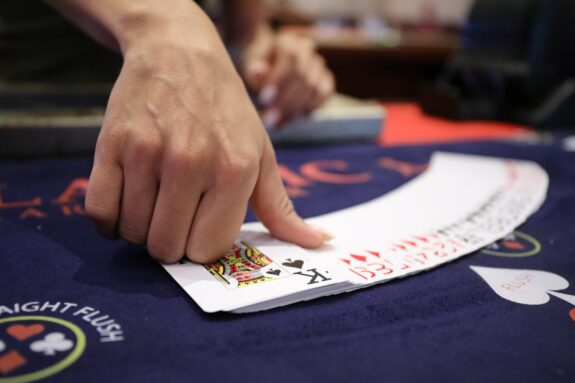
How Does The WSOP Player Of The Year Points System Work?
The World Series of Poker (WSOP) is the most prestigious and coveted tournament series in…

Are you tired of always coming up short at the casino? Do you feel like the house always has the upper hand, no matter how carefully you play? If so, you may want to consider the controversial technique of edge sorting.
Edge sorting is a card-counting strategy that involves identifying subtle differences in the patterns or designs on the backs of playing cards. These imperfections, often caused by manufacturing flaws or uneven cutting, can be used to predict the order of the cards as they are dealt. By keeping track of which cards have been played and which ones remain, skilled edge sorters can gain a significant advantage over the casino.
The process of edge sorting typically begins with a careful examination of the playing cards. Players will look for any irregularities or asymmetries in the card backs, such as slightly misaligned patterns or variations in the printing quality. Once these differences have been identified, the player will then try to position the cards in a specific way, often by asking the dealer to rotate certain cards or by requesting a new deck with a different card design.
As the game progresses, the edge sorter will closely monitor the cards that are dealt, keeping track of which ones have been played and which ones remain. By utilizing their knowledge of the card patterns, they can make informed decisions about their bets, potentially increasing their chances of winning.
While some view edge sorting as a clever strategy for gaining an advantage in the casino, others see it as a form of cheating. The main argument against edge sorting is that it involves manipulating the game in a way that was not intended by the casino, giving the player an unfair edge.
Proponents of edge sorting, on the other hand, argue that it is a legitimate technique that requires skill, practice, and quick thinking. They contend that by using their observational skills and knowledge of card patterns, they are simply outsmarting the casino, much like a skilled poker player would use their strategic prowess to win.
The legality of edge sorting is a topic of much debate. Some jurisdictions consider it a form of cheating and have banned the practice, while others view it as a permissible strategy. This legal ambiguity has led to a number of high-profile cases, where edge sorting players have been accused of wrongdoing and faced significant legal and financial consequences.
One of the most well-known cases of edge sorting in the casino industry is that of Phil Ivey, a professional poker player who used the technique to win millions of dollars from the Borgata Casino in Atlantic City, New Jersey. Ivey and his partner, Cheung Yin “Kelly” Sun, exploited the manufacturing flaws in the casino’s playing cards to gain an advantage at the baccarat tables.
In 2012, Ivey and Sun requested a private room, asked for a specific brand of playing cards, and instructed the dealer to rotate certain cards in a specific way. By using this carefully orchestrated strategy, they were able to identify the high-value cards and place bets accordingly, ultimately winning over $9 million.
The Borgata Casino, however, was not amused by Ivey’s success and filed a lawsuit, accusing him of cheating. After a lengthy legal battle, the court ruled in favor of the casino, ordering Ivey to repay the $9.6 million he had won through edge sorting.
Another high-profile case of edge sorting involves the British professional gambler, Phil Ivey, who used a similar technique to win millions of dollars from the Crockfords Casino in London. In this case, Ivey and his partner were able to identify the patterns on the casino’s playing cards and use that information to their advantage at the baccarat tables.
The legality of edge sorting is a complex and often ambiguous issue, with different jurisdictions taking different approaches to the practice.
In some countries, such as the United States, edge sorting is generally considered a form of cheating and is therefore illegal. The Borgata Casino case, for example, set a precedent that edge sorting is a violation of the casino’s rules and can be grounds for legal action.
However, in other parts of the world, the legality of edge sorting is less clear-cut. In the United Kingdom, for instance, the courts have ruled that edge sorting is not necessarily a form of cheating, as long as the player does not physically tamper with the cards or engage in any other deceptive behavior.
The legal implications of edge sorting can also vary depending on the specific circumstances of each case. Factors such as the player’s intent, the casino’s policies, and the degree of manipulation involved can all play a role in determining whether the practice is considered legitimate or illegal.
Given the potential advantages that edge sorting can provide to players, casinos have had to develop various strategies to prevent this technique from being used against them.
One of the most common approaches is to use playing cards with more uniform and symmetrical patterns on the backs. This makes it much more difficult for players to identify any subtle irregularities or imperfections that could be used for edge sorting.
Casinos may also implement strict policies and procedures for handling and inspecting playing cards, such as regularly replacing decks, shuffling cards thoroughly, and closely monitoring the actions of players at the tables.
In addition, some casinos have started to use specialized card-reading technology, which can automatically detect any deviations or irregularities in the card backs. This allows the casino to quickly identify and address any potential edge sorting attempts, reducing the risk of significant financial losses.
While edge sorting may be a controversial strategy, there are other legitimate techniques that players can use to gain an advantage in the casino.
One of the most well-known and widely accepted strategies is card counting, which involves keeping track of the cards that have been dealt in a game of blackjack. By understanding the probability of certain cards being dealt next, players can make more informed decisions about their bets and improve their chances of winning.
Another approach is to take advantage of casino bonuses and promotions, such as welcome offers, reload bonuses, and free spins. By carefully selecting the most lucrative deals and understanding the associated terms and conditions, players can effectively increase their bankroll and extend their playing time.
Additionally, players can focus on developing their skills and knowledge in specific games, such as poker or sports betting. By studying the game mechanics, analyzing data, and honing their decision-making abilities, players can gain a competitive edge over the house without resorting to questionable techniques like edge sorting.
The use of edge sorting in the casino industry raises a number of ethical concerns that are worth considering.
On one hand, proponents of edge sorting argue that it is a legitimate strategy that requires skill, observation, and quick thinking – much like other gambling techniques, such as card counting. They contend that by using their knowledge and abilities to outsmart the casino, they are simply playing the game in a more strategic and advantageous way.
However, critics of edge sorting argue that it is a form of cheating, as it involves manipulating the game in a way that was not intended by the casino. They assert that edge sorting gives players an unfair advantage, undermining the principles of fair play and honest competition that are integral to the gambling industry.
Moreover, the potential financial impact of edge sorting on casinos can be significant, leading to substantial losses and potentially threatening the viability of these establishments. This raises questions about the broader societal implications of edge sorting, as the success of casinos can be important for local economies and job creation.
Ultimately, the ethical considerations surrounding edge sorting are complex and multifaceted. While some may see it as a clever strategy, others may view it as a morally questionable practice that undermines the integrity of the gambling industry. As with any controversial issue, it is important for individuals to carefully weigh the pros and cons and come to their own informed conclusions.
As the debate around edge sorting continues, it is clear that the gambling industry will need to adapt and evolve to address this challenge.
One possible path forward is for casinos to invest more heavily in technological solutions, such as advanced card-reading systems and sophisticated shuffling machines, to detect and prevent edge sorting attempts. This could help to level the playing field and restore the house’s advantage, ensuring that the games remain fair and accessible to all players.
Another approach could be for the industry to work with lawmakers and regulators to establish clear and consistent guidelines around the legality of edge sorting. By creating a more unified and well-defined legal framework, casinos and players alike would have a better understanding of what is and is not permitted, reducing the potential for legal disputes and uncertainty.
Additionally, the gambling industry may need to explore new ways of engaging with and educating players. This could involve greater transparency around game mechanics, more comprehensive player education programs, and the development of alternative strategies that allow players to gain an edge without resorting to questionable techniques like edge sorting.
Ultimately, the future of edge sorting in the gambling industry will likely depend on a combination of technological advancements, regulatory changes, and a renewed focus on fostering a culture of trust, integrity, and fair play. As the industry continues to evolve, it will be crucial for all stakeholders to work together to find a balanced and sustainable solution that serves the interests of both casinos and players.
In the end, the debate around edge sorting is a complex and multifaceted one, with valid arguments on both sides. On the one hand, proponents of edge sorting argue that it is a legitimate strategy that requires skill, observation, and quick thinking – much like other gambling techniques, such as card counting. They contend that by using their knowledge and abilities to outsmart the casino, they are simply playing the game in a more strategic and advantageous way. Critics, on the other hand, view edge sorting as a form of cheating that gives players an unfair advantage and undermines the principles of fair play and honest competition that are integral to the gambling industry. They argue that the potential financial impact of edge sorting on casinos can be significant, leading to substantial losses and potentially threatening the viability of these establishments.